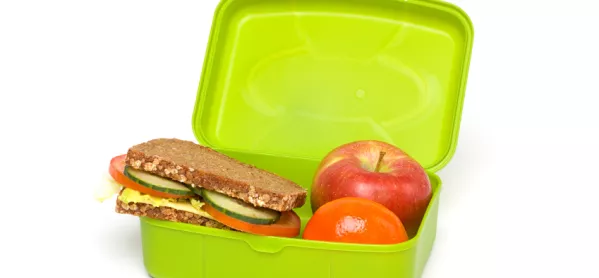The fee, which is used to cover the cost of cleaning and supervision in lunch areas, has been described as “shocking” by the NASUWT teaching union, which discovered the practice.
Schools are making the charges as school budgets are being increasingly squeezed: a recent survey by the Association of School and College Leaders found that 90 per cent of secondary leaders believe that the financial situation will become critical, very serious or serious over the next 12 months.
Patrick Roach, the NASUWT’s deputy general secretary, told TES he thought the charges - said to be made in both state primary and secondary schools - were “disgraceful”.
“Now just sitting in a dining hall and unwrapping your sandwiches is considered to be an optional extra, it’s disgraceful, it’s shocking,” he said. “Parents should be appalled in just the same way that we’re appalled.”
The union says that it expects more schools to start doing this as they feel the financial pinch. The charge for packed lunches comes as children in reception to year 2 continue to benefit from the controversial universal free school meals policy introduced under the coalition government.
However, extra funding for small schools who struggle to provide the meals was recently axed by the government.
Chris Keates, the union’s general secretary, said: “What the government doesn’t face up to is, the minute you free up the system then this is what people do, and if you’re squeezing them also on school funding they’re going to look at where they can do it.
“And now the government’s actually changing the funding system and it’s widely anticipated that there’s going to be thousands of schools losing a lot of money.
“Unless the government sets out clearly what schools can and cannot charge for, then we’re going to get more of this.”
A survey by the NASUWT, which has not yet been published, found 14 parents reported being charged between 10p and 60p per day for their children to eat home-made lunches at school, with the money being used to pay for cleaners and lunch supervisors.
But Dr Roach said he thought cases of this were “probably more extensive than our survey reveals”.
And Ms Keates said she had heard of other cases in which schools were charging more. A secondary school in the south east was charging £1.80 per day, she said, and a primary in Yorkshire was charging £1.
“Schools are justifying it by saying, ‘you’re having to be supervised to eat your lunch and therefore if you’re not having a school meal, you’ve got to contribute towards that supervision because you’ll be in the dining room, sitting there,” she said.
But she warned that parents “almost feel like they’re being fined because they haven’t gone for the school meal”.
Brian Cookson, honorary treasurer of the NASUWT and a school sixth form teacher in Staffordshire, told the conference this measure would have been unthinkable when he started out as a teacher in the early 1970s.
“The children were coming from poverty stricken families but they did not have to pay for anything going on at school,” he said.
“If you’d intimated you’d charge whatever it is, 10p, to eat a sandwich lunch - it wouldn’t occur to anyone to actually do that.
“In fact, school was the safety net for these children because they could access sports facilities, they could access music, they could access their education and it wasn’t anything to do with money.”
Gareth Young, a national official at the union, told its annual conference in Birmingham this week that parents were also being asked to pay for educational visits that were an “integral or essential part of the curriculum”, such as field trips that were required for qualifications or linked to exams. He described this trend as “disturbing”.
He said there was growing evidence that some pupils were being forced to avoid studying certain subjects because they would be unable to afford the books, equipment or field trips necessary for the course.
“One of the concerns that parents have expressed is, they’ve said there should be stronger regulation by the government over how much schools are allowed to charge for the services they provide for pupils,” he said.
A spokesman for the Department of Education said it was “absolutely unacceptable” for schools to charge children to bring in packed lunches.
He added: “If schools are looking to exploit loopholes to get money out of parents we will investigate and make sure those loopholes are closed.”




